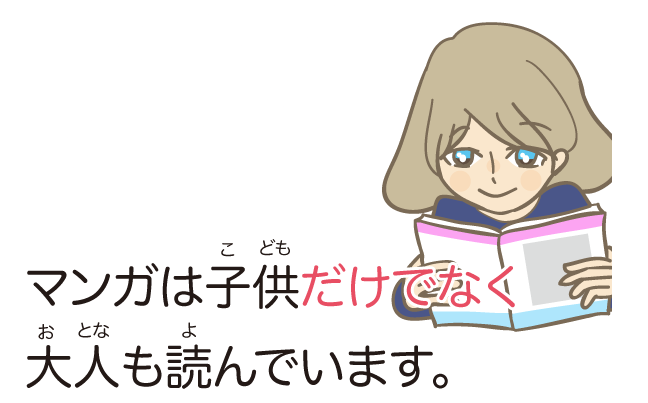The particle だけ (dake) means only, just, as much as, at least.
だけ states a limitation, something that is the only or unique among several options and choices. だけ shows the limit or maximum or minimum extent of something.
In this post we learn more about the meaning of だけ, how it is formed, and when だけ is used through real example sentences.
How だけ is formed
The particle だけ is added after verbs, adjectives and nouns. When だけ follows an adjective in な, you need to add な between the adjective and だけ:
The が and を particles are optional after だけ.
君だけを愛している。
I love only you.
How and when to use だけ
The basic meaning of だけ is to indicate that even though there are several possibilities, only one is correct or has been chosen.
今日だけ全品半額です。
Only today all products are half price.
だけ indicates that out of all possible days, only today there is a half-price discount.
一つだけ質問してもいいですか。
May I ask (only) one question?
In this second example だけ indicates that there is only one question. This sentence then uses the form てもいい to ask if it is possible to ask just one question (質問).
この漢字だけ読めない。
This is the only kanji I can't read.
0:00.00
-1:0-1.00
それを回避する方法が1つだけある。
There is only one way to prevent this from happening.
だけ at the end of the sentence
When だけ is used at the end of the sentence, it indicates that the action performed is the only thing there is, nothing but....
見ているだけです。
I am just watching.
This form is also used to indicate that it's nothing serious, nothing happened.
膝を擦り剥いただけ。
I just scratched my knee (no big deal).
だけ with potential form: all I could do
When だけ follows the potential form of a verb (れる, られる), its meaning becomes as much as possible, the best I could.
Let's see an example:
私は走れるだけ走った。
I ran as fast as I could.
In this sentence we find the verb to run (走る) in two forms:
- Before the particle だけ, the verb is conjugated in the potential form 走れる
to be able to run - After だけ, the verb is conjugated in the past tense 走った
to ran
Thus だけ indicates that I ran as far as I could run, as fast as possible (limit).
やれるだけのことはやった。
I did the best I could.
だけ: at least
Another meaning of だけ is at least. This meaning is related to the concept of limit, in this case a minimum or lower limit.
いくら何でも15人だけは来る。
In any case, at least 15 people will come.
In this example だけ follows the term 15人 15 people, indicating a minimum limit of people who will come 来る.
Be careful in recognizing whether the limit indicated by だけ is the maximum ("maximum 15 people") or the minimum ("at least 15 people"). The correct meaning depends on the context.
0:00.00
-1:0-1.00
おとなしく渡せば命だけは助けてあげる。
If you give it to me without a fight, I will at least spare your life.
だけ with adjectives ending in な
Since adjectives in な can be used both as nouns and adjectives, you have to pay attention to how the sentence is conjugated with だけ to understand the meaning:
- When だけ is preceded by an adjective in な followed by な, then the term is an adjective
- When だけ is not preceded by な, then the adjective behaves like a noun, and the meaning of the sentence changes
好きなだけ食べてください。
Eat as much as you like.
In this sentence the adjective like 好き is followed by な. For this reason 好き acts as an adjective, and the sentence translates as eat as much as you like.
好きだけ食べてください。
Eat only what you like.
If in the same sentence there is no な after 好き, then the meaning changes. In this case 好き indicates something you like: for this reason the sentence translates as eat only the things you like.
だけでは + negative form: it is not enough
Let's see now a very useful and commonly used form that combines だけででは or simply だけで (Sentence A) with the negative form of the verb (Sentence B).
he parts preceding だけででは can be substantives, adjectives or verbs as per the initial pattern, the second part of speech on the other hand has the verb in the negative form.
This refers to an action (sentence A) that is not enough to achieve the optimal and desired result expressed by phrase B.
好きな事だけでは食べていけない。
You can't make a living just by doing what you like.
謝るだけでは許してもらえません。
Apologising is not enough to be forgiven.
だけでなく not only
だけでなく and だけではなく use the adverbial form of でない and ではない.
では can be replaced by じゃ: だけじゃなく.
Commentary on a YouTube music video:

この曲を聞くと心洗われるだけでなく懐かしい気持ちになります。
Listening to this song not only cleanses my soul but also fills me with a sense of nostalgia.

マンガは子供だけでなく大人も読んでいます。
Not only children read manga, but adults do too.
Other examples of だけ
10分だけ休みましょう。
Let's take a break of only 10 minutes.
宿題をできるだけやってください。
Do as much as you can with your homework please.
Similar grammar points in Japanese 📚
から
から (kara) Meaning Japanese Grammar - Because
たりする
たりする (tari suru) Meaning Japanese Grammar - Do Such Things as A, B Etc
ちがう
ちがう (chigau) Meaning Japanese Grammar - No
まだ
まだ (mada) Meaning Japanese Grammar - Still
ないでください
ないでください (naide kudasai) Meaning Japanese Grammar - Please Do Not Do
たい
たい (tai) Meaning Japanese Grammar - Want